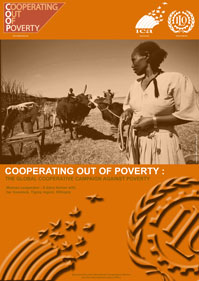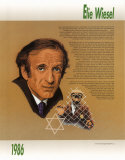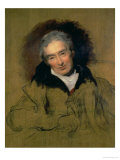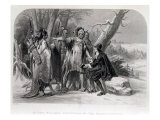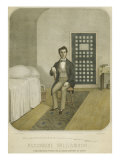|
|
|
|
|
|
|
PEACE & JUSTICE CALENDARS
|
|
|
|
|
|
|
|
|
|
|
|
|
|
|
|
|
|
|
|
|
|
|
|
|
|
|
|
|
|
 |
|
|
|
|
|
|
Elie Wiesel
b. 9-30-1928, Sighet, Transylvania
Poster Text: Upon announcing that author, philosopher, and educator Elie Wiesel would receive the 1986 Nobel Peace Prize, the head of the Nobel committee said, “Elie Wiesel has emerged as one of the most important spiritual leaders and guides ... when violence, repression, and racism continue to characterize the world. His message is one of peace ... and human dignity.” Mr. Wiesel began spreading this message after he survived one of the most horrifying expereinces humans have ever had to face – life in a Nazi concentration camp. He lived through the Holocaust – the Nazis terrible campaign to exterminate the Jewish people.
Elie Wiesel was born in 1928 in Sighet, Romania. The Wiesels were a Jewish family with one son, Elie, and three daughters. Elie expected to spend his life in this quiet little town, studying religious texts and helping in his father's store. But World War Two and the Nazis shattered this dream. The Nazis overran Europe. They rounded up Jews and sent them to prison-like concentration camps. And in the spring of 1944, the Nazis reached Sighet. The Wiesels were among the Jews herded into trains bound for concentration camps in Poland. The Wiesels were sent to Auschwitz, one of the most famous Nazi death camps. More than a million people – mostly Jews – died in the gas chambers or from starvation, illness, and abuse at Auschwitz. When the Wiesels arrived there, they were stripped of their personal possessions, and Elie's mother and sister were killed. In his book, Night, Elie Wiesel described his memory of his arrival at the concentration camp: ‘Never shall I forget that night, the first night at the camp, which has turned my life into one long night.’ Elie and his father survived Auschwitz and were sent to another camp, called Buna, where they worked on slave labors. Only a few months before World War Two ended in 1945, Elie and his father were moved again to a camp called Buchenwald. Elie's father died at Buchenwald of disease and starvation.
After World War Two, Elie Wiesel moved to Paris, where he studied philosophy. He worked as a journalist, writing for Israeli, French, and American newspapers. In 1956, he moved to the United States, and he became an American citizen seven years later. Since then Elie Wiesel has spent his time teaching, writing, and lecturing. He continues to work for human rights everywhere, and he believes that speaking out against oppression will help prevent other holocausts.
• more Elie Wiesel posters
|
|
|
|
William Wilberforce
b. 8-24-1759; Kingston upon Hull, Yorkshire, England
d. 7-29-1833; London
Politician and philanthropist William Wilberforce was a leader of the movement to abolish the slave trade in Britain.
William Wilberforce quote ~
• “You may choose to look the other way but you can never again say you did not know.” ~ Close of a speech in House of Commons (1791), as quoted in Once Blind : The Life of John Newton (2008) by Kay Marshall Strom, p. 225
|
|
|
|
Roy Wilkins
b. 8-30-1901; St. Louis, MO
d. 9-8-1981; NYC
Roy Wilkins, a civil rights activist from the 1930s to the 1970s is most remembered for his leadership of the National Association for the Advancement of Colored People (NAACP).
|
|
|
|
Emma Willard
b. 2-23-1787; CT
d. 4-15-1870
Emma Willard was a writer and women's rights advocate founding the first women's school of higher education in 1821, the Troy Female Seminary, later renamed the Emma Willard School (1895). Among notable students over the years were Elizabeth Cady Stanton, Justine Johnstone, Jane Fonda and Kirsten Gillibrand.
Emma Willard quote ~
• “If one seminary should be well organized, its advantages would be found so great that others would soon be instituted; and that sufficient patronage can be found to put one in operation may be presumed from its reasonableness and from the public opinion with regard to the present mode of female education.”
|
|
|
|
Frances Elizabeth Willard
b. 9-28-1839; Churchville, NY
d. 2-17-1898
Educator Frances E. Willard was instrumental in the passage of the Eighteenth (Prohibition) and Nineteenth (Women Suffrage) Amendments to the United States Constitution. Her argument was that female suffrage was based on “Home Protection,” which she described as “the movement...the object of which is to secure for all women above the age of twenty-one years the ballot as one means for the protection of their homes from the devastation caused by the legalized traffic in strong drink.”
Frances E. Willard quote ~
• “This seems to be the law of progress in everything we do; it moves along a spiral rather than a perpendicular; we seem to be actually going out of the way, and yet it turns out that we were really moving upward all the time.”
|
|
|
|
Betty Williams
b. 5-22-1943; Ireland
Betty Williams received the 1976 Nobel Peace Prize jointly with co-recipient Mairead Corrigan for their work as cofounders of Community of Peace People, an organization dedicated to promoting a peaceful resolution to The Troubles in Northern Ireland.
Betty Williams quotes ~
• “Nonviolence is not a thing that comes easily. You have to learn how to be nonviolent.”
• “To say that on a daily basis you can make a difference, well, you can. One act of kindness a day can do it.”
• “I swear to God, it's an incredible force for good if you can remember that nonviolence is the weapon of the strong.”
|
|
|
|
Jody Williams
b. 10-9-1950; Brattleboro, VT
Jody Williams received the 1997 Nobel Peace Prize jointly with the campaign she worked for, the International Campaign to Ban Landmines (ICBL). Williams is notable for her bringing about trans-national political collaboration.
Jody Williams quotes ~
• “In poverty, people are possessions. In the middle class, possessions means things ...”
• “Emotion without action is irrelevant ...”
|
|
|
|
Roger Williams
b. 12-21-1603; London, England
d. 4-1-1684; Rhode Island
Roger Williams, the founder of the city of Providence, RI and co-founder of the colony of Rhode Island, was a notable advocate of the separation of Church and State (the phrase “wall of separation” is attributed to Williams), and a fair dealer with Native Americans.
Roger Williams quotes ~
• “Enforced uniformity confounds civil and religious liberty and denies the principles of Christianity and civility. No man shall be required to worship or maintain a worship against his will.”
• “The greatest crime in the world is not developing your potential. When you do what you do best, you are helping not only yourself, but the world.”
• Roger Williams: Prophet of Liberty
|
|
|
|
Passmore Williamson
b. 2-23-1822; Westtown, PA
d. 2-1-1895
Abolitionist and Quaker Passmore Williamson is best known for a legal episode challenging the Fugitive Slave Law of 1850.
In 1855 he and several others that included William Still, assisted the slave Jane Johnson and her two children leave John Hill Wheeler as they were on a trip to Nicaragua where Wheeler was to be the US Ambassador.
Williamson was convicted of contempt of court and served a jail sentence from July 27 to November 3, 1855. Note the illustration of Williamson in his cell - he has a rug, chair and apparently comfortable bed - all furnished by his friends and admirers.
• The Liberation of Jane Johnson
|
|
|
|
Nobel Peace Prize Winners, 1919 -
Woodrow Wilson
b. 12-28-1856, Staunton, VA
Woodrow Wilson is usually considered to be one of our nation's three or four most successful presidents. He was without a doubt one of the the most remarkable figures in American history. Although he led the nation through a terrible war, he is best remembered as a man who devoted his life to making the world a more peaceful place for all humankind.
Thomas Woodrow Wilson was born around midnight on December 28, 1956. His mother named him after her father, but Wilson dropped the name Thomas after he graduated college. From very early on, religion and education were stressed in the Wilson household. Young Woodrow's earliest memories were of the election of Abraham Lincoln and the outbreak of the Civil War. The war forced many schools in the South to close, so Woodrow's father had to teach him at home. And every evening the Wilson's would gather to read the Bible together. In 1875, Wilson enrolled at the College of New Jersey, now called Princeton University. After graduation, Wilson went on to work as a lawyer, teacher, and politician. He served as the president of Princeton and in 1910 was elected governor of New Jersey. Wilson's strong belief in fairness, democracy, and clean government soon made him famous across the nation,and it helped him get elected President in 1912.
As President, Wilson tried desparately to keep the United States out of World War One. In fact, he was re-elected in 1916 with the campaign slogan: “Wilson – He Kept Us Out of War.” But when Germany began attacking U.S. ships, Wilson was left with no choice but to enter the war. Wilson proved to be a great wartime leader, and when the war ended he set up a plan for lasting peace. But one of the key points of his plan – the creation of an international peacekeeping organization called the League of Nations – failed to gain support. Nevertheless, Wilson's efforts won him the Nobel Peace Prize in 1919. About thirty years later, Wilson's dream came true with the creation of the United Nations. Sadly, President Wilson suffered a stroke later in 1919 and lived as an invalid until his death in 1924.
• more Woodrow Wilson posters
|
|
|
|
Walter Wink
b. 1935
Biblical scholar, professor, and minister Walter Wink was also a Fellow at the United States Institute of Peace.
Walter Wink quotes ~
• “... for God's sake, let's be done with the hypocrisy of claiming ‘I am a biblical literalist’ when everyone is a selective literalist, especially those who swear by the antihomosexual laws in the Book of Leviticus and then feast on barbecued ribs and delight in Monday-night football, for it is toevali, an abomination, not only to eat pork but merely to touch the skin of a dead pig.”
• “The polarization is such that the conservatives on this side have their prayer meeting and their choir meeting. And the liberals on this side have their prayer meeting and their choir meeting, and the two sides never get together and talk about it. The result is the tearing apart of the fabric of the body of Christ.”
• “South African Archbishop Desmond Tutu walked by a construction site on a temporary sidewalk the width of one person. A white man appeared at the other end, recognized Tutu, and said, "I don't make way for gorillas." At which Tutu stepped aside, made a deep sweeping gesture, and said, "Ah, yes, but I do."”
|
|
|
previous page | top | next
peace & justice activists list | a | b | c | d | e | f | g | h | i-j | k | l | m | n | o | p | r | s | t | u-v |
Wa-Wh | WI | Wo-Wu | x-y-z
|
|
I have searched the web for visual, text, and manipulative curriculum support materials - teaching posters, art prints, maps, charts, calendars, books and educational toys featuring famous people, places and events - to help teachers optimize their valuable time and budget.
Browsing the subject areas at NetPosterWorks.com is a learning experience where educators can plan context rich environments while comparing prices, special discounts, framing options and shipping from educational resources.
Thank you for starting your search for inspirational, motivational, and educational posters and learning materials at NetPosterWorks.com. If you need help please contact us.
|
|
|












